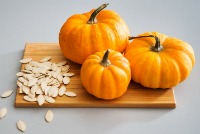It’s Pumpkin Season!

Mr. Alliance/bigstockphoto.com
From Shakespeare’s reference to “pumpion” in The Merry Wives of Windsor to The Legend of Sleepy Hollow, pumpkin is woven into the fabric of history and cuisine. Native Americans roasted long strips of pumpkin over an open flame and ate them. Colonists made pumpkin pie by slicing off the pumpkin top; removing the seeds; filling the rind with milk, spices, and honey; and then baking the pumpkin over hot ashes.
And we all know pumpkin transforms into Jack-o-lanterns for Halloween decor. Today, we appreciate pumpkin not just for culinary traditions, but also for its abundance of nutrients and versatility in healthy meal preparation, such as soufflés, soups, bread, jam, butter, and desserts.
A member of the Cucurbitaceae family of vegetables (along with cucumber and squash), pumpkin is cultivated around the world for both its fleshy vibrant orange meat and seeds. It is a naturally low calorie (49 calories per one cup serving), yet a filling food that offers the following health benefits:
Pumpkin contains no saturated fats or cholesterol. It is rich in dietary fiber, antioxidants, minerals, and many antioxidant vitamins, including A, C, and E.
It is also an excellent source of many natural polyphenolic flavonoid compounds such as beta-carotenes, lutein, and zeaxanthin. Carotenes convert into vitamin A inside the body. Zeaxanthin is a natural antioxidant that may offer protection from age-related macular disease.
Pumpkin is a good source of the B-complex group of vitamins including niacin, vitamin B-6 (pyridoxine), thiamin, and pantothenic acid.
It is a rich source of copper, calcium, potassium, and phosphorus.
Pumpkin seeds provide dietary fiber and pack a powerful mix of protein, minerals, and vitamins: 1 cup of pumpkin seeds provide 559 calories, 30 g of protein, plus folate, iron, niacin, selenium, and zinc.
Resources
Cho, E., et al. Prospective Study of Intake of Fruits, Vegetables, Vitamins, and Carotenoids and Risk of Age-related Maculopathy. Archives of Ophthalmology 122, no. 6 (June 2004): 883-92. http://www.ncbi.nlm.nih.gov/pubmed/15197064
The History Channel. Pumpkin Fact Videos. http://www.history.com/topics/halloween/pumpkin-facts/videos
Medical News Today. What Are the Health Benefits of Pumpkin? Updated August 30, 2014. http://www.medicalnewstoday.com/articles/279610.php
United States Department of Agriculture. Pumpkin Nutrition Profile. http://ndb.nal.usda.gov/ndb/foods/show/3176
University of Illinois. Watch Your Garden Grow: Pumpkin. http://extension.illinois.edu/veggies/pumpkin.cfm
World’s Healthiest Foods. Pumpkin Seeds. http://www.whfoods.com/genpage.php?tname=foodspice&dbid=82
